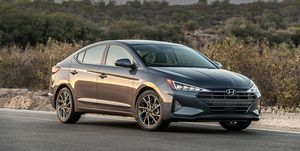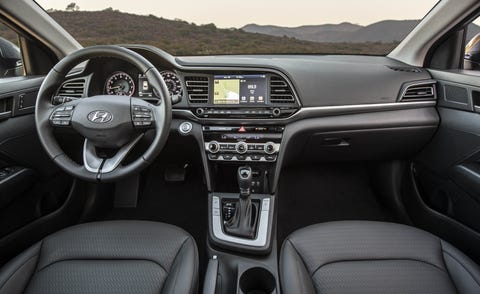
- Highs: Tons of features for the price, excellent fuel economy, peppy turbocharged engines available.
- Lows: Cramped back seat, mediocre handling, interior materials look and feel cheap.
- Verdict: Even in the value-conscious compact-car segment, the Elantra stands out as a bargain.
Overview
True
to its maker's roots, the 2020 Hyundai Elantra is a no-nonsense,
value-packed compact sedan. Every Elantra is a veritable bargain thanks
to a long list of standard equipment. While the interior materials are
decidedly budget-spec, the Elantra is easy to live with thanks in part
to the intuitive, standard touchscreen that works with Android Auto and
Apple CarPlay. The base engine is a competent but unexceptional
2.0-liter inline-four. More discerning buyers should look at either of
the turbocharged models. The Elantra Eco is rated at 41 mpg on the
highway, while the Elantra Sport makes a strong 201 horsepower.
What's New for 2020?
For
the 2020 model year, Hyundai replaced the six-speed automatic
transmission in the Elantra SE, SEL, Value Edition, and Limited with a
continuously variable automatic transmission (CVT). That change boosts
combined and city EPA fuel-economy ratings by 2 mpg, while the highway
figures increase by three. The Eco model is newly equipped with a
stop-start system and gets a 1-mpg fuel-economy bump across its EPA
ratings. All Elantras now come with automated emergency braking,
lane-keeping assistance, and dual-zone automatic climate control as
standard equipment. The manual transmission that was standard on the
Elantra SE and Sport has been discontinued.
Pricing and Suggestion
- SE: $19,880
- SEL: $20,630
- Value Edition: $21,530
- Eco: $22,180
- Limited: $23,730
- Sport: $24,730
The
Elantra Eco's turbocharged inline-four delivers strong off-the-line
acceleration and impressive fuel economy (33 mpg city and 41 mpg
highway, according to the EPA). It comes well equipped at $22,180 with
heated front seats, a proximity key with push-button start, blind-spot
monitoring, and a larger 7.0-inch touchscreen with Android Auto and
Apple CarPlay capability.
Engine, Transmission, and Performance
Elantra
models equipped with the standard 2.0-liter four-cylinder provide
acceleration numbers that are about average for the compact-sedan class,
but the engine feels sluggish until you push into the higher rev range.
The Eco model's turbocharged engine, which provides more power low in
the rev range, combines with the quick-shifting dual-clutch automatic
transmission to make for a more responsive feel around town. The Eco
does have duller throttle response; along with the different
transmission type, this means you have to depress the throttle further
to get the car to accelerate with gusto.
The
Elantra's suspension tuning is firm but not harsh, with a nicely
controlled ride that soaks up bumps with minimal reverberations in the
structure. The Eco model's low-rolling-resistance tires don't provide as
much grip as the Limited model's larger wheel-and-tire setup, but the
difference isn't noticeable in everyday driving. Braking performance is a
strong suit for the Elantra, as it stops from 70 mph in a short 168
feet. The pedal feels firm, engendering confidence in a panic-stop
situation. The Eco model's tires again hinder its performance in this
test, but its pedal feel is equal to the standard 2.0-liter model's.
Fuel Economy and Real-World MPG
The
Elantra's EPA fuel-economy ratings are among the best of all compact
cars', with several trims rated at 40 mpg or higher on the highway.
While we have yet to test any 2020 Elantra, the 2019 Eco version
achieved an impressive 43 mpg in our 75-mph highway fuel-economy test.
Interior, Comfort, and Cargo
The
Elantra's dashboard has an attractive design and ergonomic controls.
Its driver's seat is positioned well, with a natural-feeling
relationship among the seat, the pedals, and the steering wheel. The
front seats are relatively comfortable, although the flat bottom cushion
isn't as supportive as we'd like. The rear seat is less roomy than some
competitors, and the bottom cushion is relatively low and could use
better thigh support.
The Elantra doesn't have
the biggest trunk in its class, but a wide trunk opening makes it easy
to load larger items. The trunk hinges impinge on some space when the
trunk is closed, however. The glovebox and center console are spacious,
although the door pockets front and rear are smaller than average.
Infotainment and Connectivity
The
Elantra offers the latest infotainment options and connectivity
features. While base models have a basic 5.0-inch display, every other
version has a standard 7.0-inch touchscreen with Apple CarPlay and
Android Auto. The interface is clear and easy to use, with
well-organized menus and plenty of hard buttons and knobs. An 8.0-inch
touchscreen with navigation, wireless charging for phones, and a more
powerful sound system are available, but a mobile Wi-Fi hotspot is not.
Safety and Driver-Assistance Features
The Elantra offers nearly all of the latest driver-assistance technologies
and achieves good crash-test results from U.S. testing agencies. Basic
features are standard across the line, while stepping up to the SEL
model adds equipment such as blind-spot monitoring and rear
cross-traffic alert. Key safety features include:
- Standard forward-collision warning and automated emergency braking
- Standard lane-departure warning and lane-keeping assist
- Available adaptive cruise control and blind-spot monitoring
Warranty and Maintenance Coverage
Hyundai
is known for its impressive warranties, and the Elantra is no
exception. Its coverage is among the best in its class, although Hyundai
does not offer complimentary scheduled maintenance as do some
competitors.
- Limited warranty covers 5 years or 60,000 miles
- Powertrain warranty covers 10 years or 100,000 miles
- No complimentary scheduled maintenance



